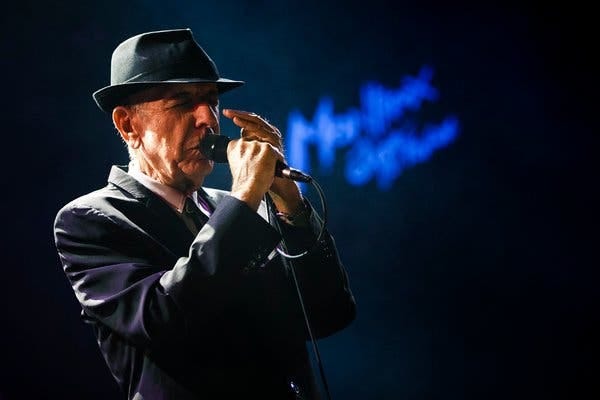The year was 2005, and Leonard Cohen was living as a monk on Mount Baldy when he received the bad news: his manager was stealing from him. Like Moses before him, Cohen literally descended from the mountaintop to review his affairs. It was even worse than he thought, as it turned out. Leonard Cohen was flat broke. All his assets—various properties, even his publishing rights—had been sold out from under him.
In a sense, we are lucky that Cohen was robbed. Over the next few years he planned and then executed a massively successful worldwide tour, blowing audiences away as he regaled old fans and created new ones with brilliant, orchestral arrangements of his classic songs. Indeed, he was better than he used to be, upending the normal dynamic of late-life tours.
Cohen toured more or less non-stop from 2008 to 2013, managing to refill his coffers (and then some). From 2012 to 2016 he recorded three albums, the last of which—You Want It Darker—was released only three weeks before his death in November of 2016. I highly recommend this lengthy, moving piece by David Remnick in The New Yorker if you want to know more about what Cohen was like near the end.
The title track from You Want It Darker stands up to anything in Cohen’s discography—and probably anyone else’s too.
Leonard Cohen was never known for his voice, although fans grew (and still grow) to enjoy his atonal mixture of deep and reedy singing. Like Dylan, his strange and specific phrasings allow the listener to zero in on the lyrical content. Cohen was self-aware on this front, including on the timeless and erotic “I'm Your Man,” when he says that he was “born with the gift of a golden voice.”
But as he approached the end of his life in the 2010s—dying of late-stage lung cancer, posed cheekily with a cigarette on his album cover—Leonard Cohen grew into his voice. By 2016, when he released “You Want It Darker,” Cohen had developed a boundless and basement-depth baritone, a warm growl that he paired with a talkier vocal approach over slower arrangements.
In the Old Testament, Moses and Abraham both argue with God at various points, explicitly bargaining for the lives of humans and challenging God’s ethical decision-making. In “You Want It Darker,” Cohen goes even further, condemning his God for his sins and fiercely approaching death.
If you are the dealer, I'm out of the game / If you are the healer, it means I’m broken and lame / If thine is the glory, then mine must be the shame / You want it darker, we kill the flame
Magnified, sanctified / Be thy holy name / Vilified, crucified, in the human frame / A million candles burning for the help that never came / You want it darker, we kill the flame
This a song that no one else can sing (although Iggy Pop, unfortunately, tried), and no one else could have written, including a younger Leonard Cohen. In one sense it is a heresy, a verbal assault on the Lord. In another it is reverent, because Cohen still speaks of the “holy name” and blames God for not coming to the aid of a “million candles burning.” These are not new themes for Cohen—look at “Hallelujah,” a song about sex and pain whose final verse approaches “The Lord of Song—” but here they feel fresh and resonant, weighty with awareness of the approaching darkness.
Cohen still manages to insert some of his trademark wit, as he describes struggling “with some demons that were middle-class and tame.” This is winking, to some extent—Cohen caroused and philandered with the best of them. Forget “Chelsea Hotel #2;” the prude and elegaic-sounding “Sisters Of Mercy” is about a threesome he had with backpackers in Edmonton.
But this song is deadly serious, as evidenced by the chorus, which is backed by the vocals of a synagogue cantor and choir from his Canadian hometown (a move that strategically biographizes this song).
Hineni, Hineni / I'm ready, my Lord
“Hineni,” pronounced Hee-Nay-Nee, is Biblical Hebrew. It means “Here I am.” It is what Moses says when he confronts the burning bush and hears the voice of God. It is what Abraham says when God commands him to sacrifice his son Isaac. And it is what Leonard Cohen chose to sing on his deathbed, confessing his sins and confronting his God and accepting death after a long, wonky, and deeply Jewish life.





In recent weeks I’ve been listening to fair amount of Cohen. I realized I have not given him a fair shake. Of all the great songwriters, I’m least familiar with him. I haven’t listened to any music from this era. Or not that I recall. I may need to revisit this after I do so.
I listened to "You Want It Darker" so often when it first released. I love when artists like Cohen craft albums that invite us to confront the complexities of life, death, and longing on a deeply personal level. This is also evident in Lou Reed's "Magic & Loss," Nick Cave's "Skeleton Tree," and David Bowie's final album, "Blackstar."